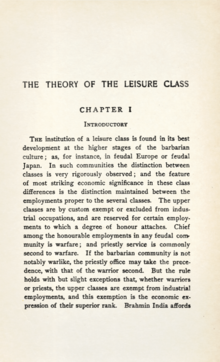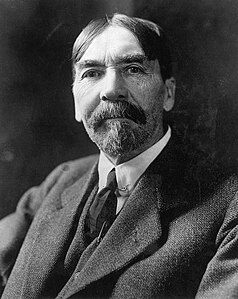Thorstein Veblen
| Nom original | (en) Thorstein Bunde Veblen |
|---|---|
| Biografia | |
| Naixement | 30 juliol 1857 Cato (Wisconsin) (en) |
| Mort | 3 agost 1929 Menlo Park (Califòrnia) |
| Sepultura | cap valor |
| Religió | Ateisme |
| Formació | Universitat Yale - Philosophiæ doctor (–1884) Carleton College - Grau en Arts (–1880) Universitat Johns Hopkins |
| Director de tesi | William Graham Sumner |
| Activitat | |
| Camp de treball | Economia |
| Ocupació | economista, escriptor, sociòleg, catedràtic |
| Ocupador | Universitat de Missouri Universitat de Chicago Universitat Stanford New School for Social Research |
| Partit | Partit Socialista d'Amèrica |
| Alumnes | Katharine Bement Davis |
| Obra | |
Obres destacables | |
| Estudiant doctoral | George W. Stocking i Herbert J. Davenport |
| Localització dels arxius | |
| Família | |
| Germans | Andrew Anderson Veblen |
| Parents | Oswald Veblen, nebot |
| Premis | |
| |
Thorstein Bunde Veblen (Cato, Wisconsin, 30 de juliol de 1857 - Sand Hill Road, Menlo Park, Califòrnia, 3 d'agost de 1929) fou un economista, sociòleg i professor estatunidenc, va destacar per la seva investigació de l'estructura econòmica de la societat i per la seva anàlisi del sistema econòmic contemporani.
Biografia
[modifica]
Thorstein Bunde Veblen va ser un dels nou fills de Thomas Andersen Veblen i Kari Torsteinsdatter Bunde, immigrants noruecs, establerts a Wisconsin el 1847. El 1865 la família va traslladar-se a Nerstrand, a l'estat de Minnesota, on hi havia molts altres immigrants originaris del mateix poble de Suècia.[1] En el poble parlaven noruec, que, a més de ser la llengua materna de molts dels seus habitants, també l'aprenien a l'escola parroquial. L'anglès el va aprendre a l'escola americana. Un oncle seu tenia una gran biblioteca i Veblen hi llegia també llibres en alemany, llatí i grec.[1] Va estudiar al Carleton College de Northfield (Minnesota) i després va estudia filosofia a les universitats Johns Hopkins i Yale; en aquesta última va graduar-se l'any 1884.[2] Aquell mateix any va tornar a la granja familiar perquè va contreure la malària. Va tenir una convalescència molt llarga, que va aprofitar per llegir molt.[1] El 1891 va tornar a l'ambient acadèmic, com a estudiant postgraduat a la Universitat Cornell.[2]
Fou professor d'economia política a la Universitat de Chicago de 1892 a 1906 i d'economia a la Universitat Stanford a Palo Alto (Califòrnia) de 1906 a 1909. De 1911 a 1918 va ser professor a la Universitat de Missouri. A partir de 1919 i fins a 1929 va treballar a la New School for Social Research (avui dia, The New School), a Nova York. El 1926 es va retirar a Califòrnia, on va viure fins a la mort, el 3 d'agost de 1929.[2]
Velben, criat en una economia marcadament familiar i cooperativa, dins de la qual es produïa gran part del que consumia i en el que la solidaritat ocupava un rol fonamental, pot haver influït amb la simpatia que tingué després vers les organitzacions simples i amb una limitada orientació cap al mercat. Tot i treballar de professor a diverses universitat no va poder ingressar com a acadèmic en cap. Sembla que això no fou degut a les seves posicions heterodoxes sinó més aviat a les preferències de les universitats que en la selecció tenien molt en compte la posició social dels aspirants.
L'obra de Veblen, molt influïda per la de Marx tot i que crítica amb ella, comprèn l'antropologia, la sociologia i la psicologia. Creia que l'economia estava molt moldejada per la cultura i que no existia una natura humana universal que fos capaç d'explicar l'enorme quantitat de normes i comportaments descoberts per l'antropologia.
La seva obra més coneguda és The Theory of the Leisure Class (Teoria de la classe ociosa), publicada el 1899, un llibre innovador, irònic i mordaç que criticava l'economia neoclàssica de l'època.[1] Veblen dividia la societat en tres classes; una classe depredadora, o ociosa, propietària dels negocis; la classe tècnica, que té els coneixements; i una classe treballadora que produeix els béns. Veblen descriu la classe ociosa com una classe parasitària per a l'economia. Apunta que l'acumulació dels béns i l'oci són un distintiu social, per a destacar i mostrar a la societat que el seu propietari no treballa. I el principal mecanisme entre classes socials contigües és l'emulació, pel qual, per exemple els membres de la classe mitjana (tècnica, en paraules de Veblen), intenten emular i parèixer-se a la classe ociosa, tant en els seus comportaments, com en les propietats o l'oci.
Bibliografia de Veblen
[modifica]Llibres publicats
[modifica]- 1899. The Theory of the Leisure Class. New York: MacMillan. Available at the Internet Archive and Project Gutenberg.
- 1904. The Theory of Business Enterprise. New York: Charles Scribner's Sons.
- 1914. The Instinct of Workmanship and the State of the Industrial Arts. New York: MacMillan.
- 1915. Imperial Germany and the Industrial Revolution. New York: MacMillan.
- 1917. An Inquiry into the Nature of Peace and the Terms of Its Perpetuation. New York: MacMillan. Also available at Project Gutenberg.
- 1918. The Higher Learning in America: A Memorandum on the Conduct of Universities by Business Men. New York: B. W. Huebsch.
- 1919. The Place of Science in Modern Civilisation and Other Essays. New York: B. W. Huebsch. Also available at Project Gutenberg and in PDF.
- 1919. The Vested Interests and the Common Man. New York: B. W. Huebsch.
- 1921. The Engineers and the Price System. New York: B. W. Huebsch.
- 1923. Absentee Ownership and Business Enterprise in Recent Times: The Case of America. New York: B. W. Huebsch.
Articles publicats
[modifica]- 1884. "Kant's Critique of Judgement." Journal of Speculative Philosophy.
- 1891. "Some Neglected Points in the Theory of Socialism." Annals of AAPSS. JSTOR 1008995.
- 1892. "Bohm-Bawerk's Definition of Capital and the Source of Wages." Quarterly Journal of Economics (QJE).
- 1892. "The Overproduction Fallacy." QJE. JSTOR 1882520.
- 1893. "The Food Supply and the Price of Wheat", Journal of Political Economy (JPE). JSTOR 1817524.
- 1894. "The Army of the Commonweal." JPE. JSTOR 1819238
- 1894. "The Economic Theory of Women's Dress." Popular Science Monthly.
- 1896. "Review of Karl Marx's 'Poverty of Philosophy'." JPE.
- 1897. "Review of Werner Sombart's 'Sozialismus'." JPE.
- 1898. "Review of Gustav Schmoller's 'Über einige Grundfragen der Sozialpolitik'." JPE.
- 1898. "Review of Turgot's 'Reflections'." JPE.
- 1898. "Why is Economics Not an Evolutionary Science?" QJE.
- 1898. "The Beginnings of Ownership." American Journal of Sociology (AJS).
- 1898. "The Instinct of Workmanship and the Irksomeness of Labor." AJS.
- 1898. "The Barbarian Status of Women." AJS.
- 1899–1900. "The Preconceptions of Economic Science," Part 1, Part 2, Part 3. QJE.
- 1901. "Industrial and Pecuniary Employments." Publications of the AEA. JSTOR 2485814.
- 1901. "Gustav Schmoller's 'Economics'." QJE. JSTOR 1882903.
- 1902. "Arts and Crafts." JPE. JSTOR 1822624.
- 1903. "Review of Werner Sombart's 'Der moderne Kapitalismus'." JPE. JSTOR 1817297.
- 1903. "Review of J.A. Hobson's Imperialism", JPE. in JSTOR
- 1904. "An Early Experiment in Trusts", JPE. in JSTOR
- 1904. "Review of Adam Smith's Wealth of Nations", JPE. in JSTOR
- 1905. "Credit and Prices", JPE. in JSTOR
- 1906. "The Place of Science in Modern Civilization", AJS. in JSTOR
- 1906. "Professor Clark's Economics", QJE. in JSTOR
- 1906–1907. "The Socialist Economics of Karl Marx and His Followers", QJE.
- 1907. "Fisher's Capital and Income", Political Science Quarterly.
- 1908. "On the Nature of Capital" QJE. in JSTOR
- 1909. "Fisher's Rate of Interest." Political Science Quarterly.
- 1909. "The Limitations of Marginal Utility." JPE. in JSTOR
- 1910. "Christian Morals and the Competitive System", International J of Ethics. in JSTOR
- 1913. "The Mutation Theory and the Blond Race", Journal of Race Development. in JSTOR
- 1913. "The Blond Race and the Aryan Culture", Univ of Missouri Bulletin.
- 1915. "The Opportunity of Japan", Journal of Race Development. in JSTOR
- 1918. "On the General Principles of a Policy of Reconstruction", J of the National Institute of Social Sciences.
- 1918. "Passing of National Frontiers", Dial.
- 1918. "Menial Servants during the Period of War", Public.
- 1918. "Farm Labor for the Period of War", Public.
- 1918. "The War and Higher Learning", Dial.
- 1918. "The Modern Point of View and the New Order", Dial.
- 1919. "The Intellectual Pre-Eminence of Jews in Modern Europe", Political Science Quarterly. in JSTOR
- 1919. "On the Nature and Uses of Sabotage", Dial.
- 1919. "Bolshevism is a Menace to the Vested Interests", Dial.
- 1919. "Peace", Dial.
- 1919. "The Captains of Finance and the Engineers", Dial.
- 1919. "The Industrial System and the Captains of Industry", Dial.
- 1920. "Review of J.M.Keynes' Economic Consequences of the Peace, Political Science Quarterly.
- 1925. "Economic theory in the Calculable Future", AER.
- 1925. "Introduction" in The Laxdæla saga.
Referències
[modifica]- ↑ 1,0 1,1 1,2 1,3 «Thorstein Veblen» (en noruec). Norsk biografisk leksikon, 14-12-2021. [Consulta: 6 març 2022].
- ↑ 2,0 2,1 2,2 «Thorstein Veblen | American economist and sociologist» (en anglès). Britannica. [Consulta: 6 març 2022].
- Economistes estatunidencs
- Sociòlegs estatunidencs
- Professors d'economia
- Professors de sociologia
- Alumnes de la Universitat Johns Hopkins
- Alumnes de la Universitat Yale
- Alumnes del Carleton College
- Morts a Califòrnia
- Persones de Wisconsin
- Professors de la Universitat de Missouri
- Professors de la Universitat de Chicago
- Professors de la Universitat Stanford
- Noruecs
- Naixements del 1857

